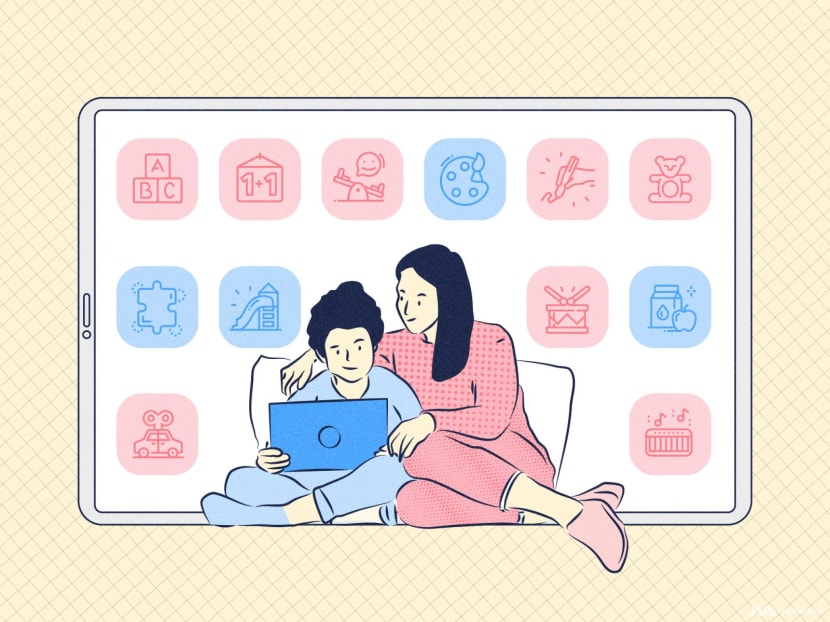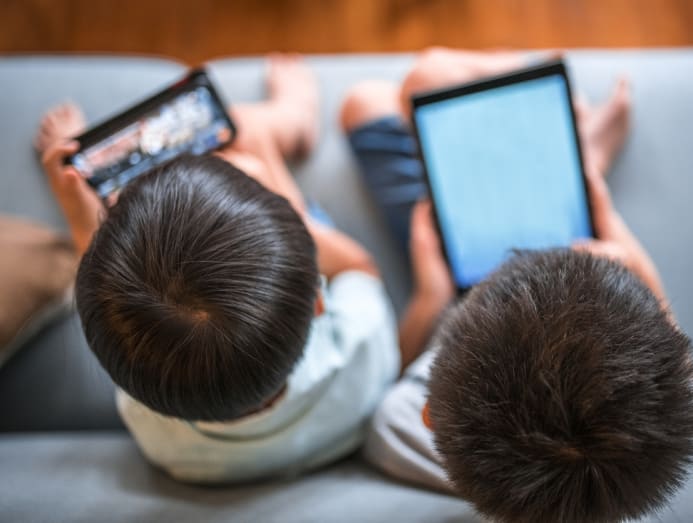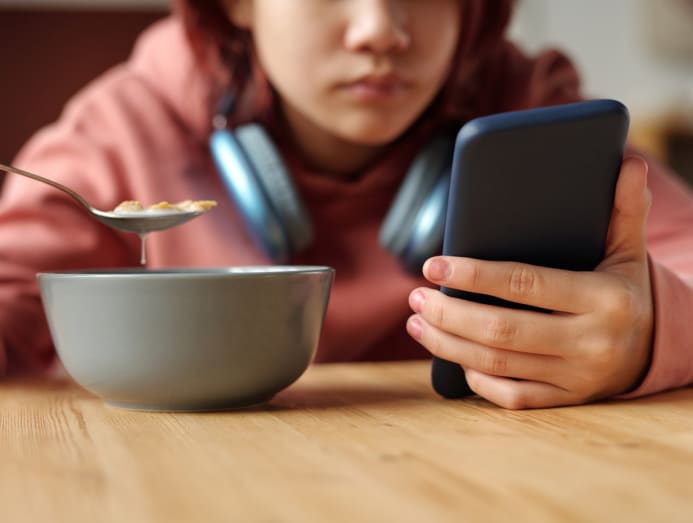Worried your child is getting too much screen time? Show them entertainment doesn't only come from devices
Experts suggested demarcating tech-free zones in the home, showing children that entertainment does not only come from a device and discussing what your teenagers are consuming online.

Parenting experts said that nothing beats setting a positive example for children, which means adults need to moderate their use of digital devices as well. (Illustration: CNA/Samuel Woo)

This audio is generated by an AI tool.
Adulthood is not just one phase of life but comes in stages. Its many facets can be overwhelming, from managing finances and buying a home to achieving work-life balance and maintaining healthy relationships. In this series, CNA TODAY's journalists help readers deal with the many challenges of being an adult and learn something themselves in the process.
Despite working in the technology sector, Mr Alfred Siew, 50, is like many other parents in that he struggles to control his children’s screen time.
The editor of a technology blog readily admits that his two children spend more time on digital devices for entertainment than on homework.
“At most, they go for an online class for two hours but they can watch Netflix for hours,” he said of the movie streaming platform.
He also sometimes finds it difficult to tell when they are playing or learning because the lines between the two are often blurred in some educational portals such as the Singapore Student Learning Space and KooBits, which use gamification as a teaching tool.
“So, do I tell them. 'You cannot play that'? My kids are also quite smart and tell me that they are using KooBits, but there are games inside so I can’t block KooBits.”
Managing children's screen time has always been a tricky issue but perhaps even more so since 2021, when the Ministry of Education issued laptops and electronic tablets to all secondary school students for their personal learning.
This brought digital devices into the home – whether parents liked it or not – and has opened up the possibility of students getting distracted by non-educational activities on these devices such as when they watch videos on YouTube and TikTok.
Device management applications such as Mobile Guardian and Blocksi are pre-installed on these devices to prevent access to undesirable online content but some students have found ways to bypass these apps and a global cyber-security breach in August forced schools to remove Mobile Guardian on these devices.
So with the ubiquity of digital devices, how should parents step in to ensure that their children use online tools in moderation?

SETTING PHYSICAL, TIME BOUNDARIES
Parenting experts said that ideally, mobile phones and tablets should not be introduced to children unless absolutely necessary.
Mr Jumh Tantri, parenting coach from Hesed Psychotherapy International, said: “Think many times before giving your children a gadget. If it’s not a school requirement, better delay it until the kids have a strong digital literacy.”
Acknowledging that for most parents that ship has sailed, experts advised incremental usage and finally "ownership" of such devices.
Dr Jiow Hee Jhee, who is an associate professor at the Singapore Institute of Technology researching the impact of digital media on families, said that there needs to be a distinction between ownership and usage.
"Let the children use the device purposefully for a few hours, then return the device to the parents.
"So start with usage, slowly build up and allow longer usage times, and train them to be responsible,” Dr Jiow added. His own children started out using his spare mobile phones when they needed to inform him of the time they completed their co-curricular activities.
If such devices are already a part of children's lives, parenting experts pointed out that screen time is not necessarily a bad thing if consumed in moderation and with a purpose.
Mr Tantri the parenting coach considers two hours or less of screen time a "healthy amount" as long as a break is taken every 20 to 30 minutes. More than three hours, he pointed out, can lead to myopia, obesity and social isolation, among other issues.
Overall, parents need to ensure that their children are not neglecting their sleep time, oral hygiene, meal times or intentionally not urinating and holding it in their bladders just to use their devices.
In addition to instilling time limitations, it is also advisable to demarcate tech-free areas in the home to help "maintain a balance of screen-based and non-screen-based activities around the house", Mr Tantri said.
Another suggestion is to use separate devices for learning and entertainment. This way, there is a clear distinction between the devices, which minimises distraction.
"Parents should monitor learning devices to ensure that social media apps, games and other forms of entertainment are not installed there," Mr Tantri added.
Parenting experts said that nothing beats setting a positive example for children, which means adults need to abide by these tech-free zones as well.
One parent, 46-year-old Ksther Lim who runs her own human resources consulting firm, made it a rule that mobile phones are not allowed at the dining table during meal times.
Setting a positive example also means showing children how adults themselves have a healthy balance between online and offline worlds, the experts said.
This means showing them that entertainment does not have to come from a device. After their child’s screen time is up, parents should consider taking them to public libraries, museums and playgrounds or letting them do household chores.
“These make for great group activities that engage the different senses and activate different parts of the brain for great mental and physiological health,” Mr Tantri said.

HONEST DISCUSSIONS ABOUT RESPONSIBLE DEVICE USE
Parenting experts stressed the importance of open communication with their children from a young age about the use of such devices.
Among the questions parents can ask themselves are:
- Why are they overindulging in screen time?
- Are they missing human connections and are therefore seeking companionship by gaming and chatting with online friends?
Using this knowledge, Mr Tantri suggested that parents and children can then intentionally come up with rules together in terms of how they would like to balance online and offline time.
To prevent future disputes, parents also need to be transparent in discussing the types of content that are allowed and actively engage in a dialogue about their children’s media consumption.
Digital wellness educator and family coach Carol Loi said: “Discuss openly who your children are following on social media. Why are your children following these influencers and what they are learning from them?
“Listen actively and be open to hearing their perspectives. Building a culture of openness and transparency will reduce disagreements in the family because there will be a focus on how to journey life together.”
She added that when disagreements happen, they can focus on the values that the family holds dear. For example, they can talk about why or why not does a particular influencer create a positive impact on society.
Ms Lim the parent who does not allow mobile phones at meal times said that she has managed to cultivate this level of trust with her 15-year-old son. He shows her his social media feed so that they may talk about what is trending and what he enjoys watching online.
Although she sometimes disagrees with the content that he is consuming, her son is receptive to a discussion on the issue.
For instance, she wanted him to stop following a gaming YouTuber's channel because the influencer used a significant amount of profanity in his speech.
However, her son reassured her that he would not start swearing like the YouTuber. She kept a watchful eye on his language and since he kept his promise, she did not insist that he stop following that influencer.
Mr Tantri emphasised that parents have to make their children see that any dialogue comes from a good place and that they do not want their young to be disadvantaged by the consequences of irresponsible screen use.
Parents should also adapt rules at home as their children grow up. For example, 12-year-olds usually require close monitoring and sensitive communication in explaining strict rules, whereas 16-year-olds need less of that because they should understand the need for such rules and the consequences.
TIPS TO KEEP SCREEN ACTIVITY IN CHECK
Beyond conversations and setting boundaries, parents may also turn to a few common apps to monitor their children’s screen activities including Microsoft Family Safety and Google Family Link.
These apps allow parents to set screen time limits and filter any inappropriate content that may be harmful to children of a certain age group.
Parental control software is not foolproof, of course.
Teenagers may figure out ways to bypass parental control software by looking for loopholes on online discussion forums. Those familiar with hacking – through their experience in gaming and coding – are also likely to know how to handle technical situations such as de-configuring the system, Mr Tantri said.
Tech blog editor Alfred Siew said that parents would do well to change their passwords once in a while. He said that his own children figured out the passwords of other adult family members’ mobile phones because the adults typed the passwords in front of the children.
“They did this many times. This is problematic because they are logged in as an adult and there are no parental controls,” he said.
Dr Jiow, who is a member of the Media Literacy Council, said that one of his studies found that a child installed a video camera at a strategic location in the house and was able to see the parent typing in the password.
It is not always easy to stay ahead of these techniques but Mr Tantri suggested that parents may start by thinking from the perspective of a child and understanding how they might choose to bypass parental controls.
When it comes to preventing the misuse of education apps as distractions, parents should allocate time to check with their children on their progress to ascertain if the time invested in these learning apps is producing the intended results, Mr Tantri added.
Ms Loi the digital family educator pointed out that the most effective parental control software is “heartware”.
“Invest time and energy to build a strong bond ... The best tools are the internal filtering and monitoring tools that our children build for themselves, to discern what is right and wrong, healthy or not healthy, on their own,” she said.



.jpg?itok=ACZ-kG0H)
.jpg?itok=pgz49ncK)








